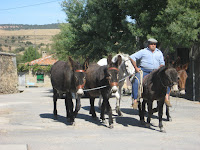Tax burden

Today is the first day that we Spanish tax payers have been able to sort out either under or over payments in the 2016 tax year. The Spanish tax year is the calendar year. Everyone, resident in Spain, who earns over 22,000€ or has more than one source of income, has to make a tax declaration. If you earn money from more than one source you don't need to make a declaration if you earn less than 12,000€. The declaration is on worldwide income. What happens is that the tax office, Hacienda to you and me, sends out a thing called a borrador, a draft assessment. Once you are on the website you can check if the borrador looks fair enough. If you have just one job with one salary and things are pretty much as they were last year you may have to tweak a few things but, chances are, that the borrador will be close to the truth. For quite a few years all I did was to have a quick scan and press the accept button because Hacienda usually sent me back a few euros. If your situation is a ...
